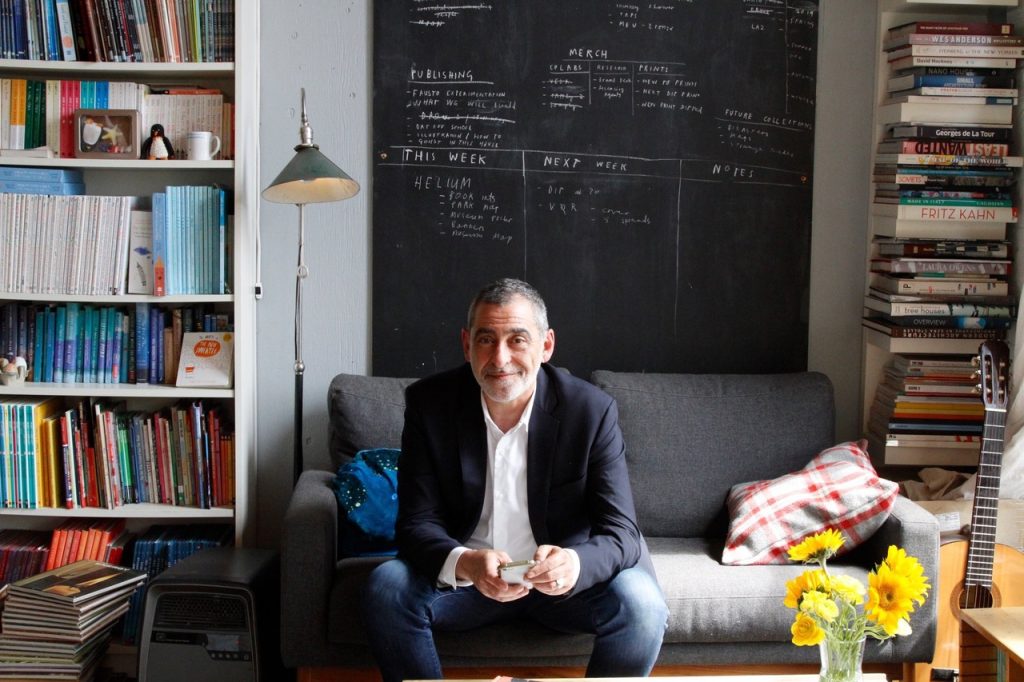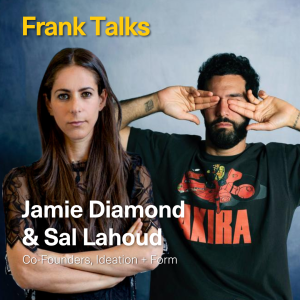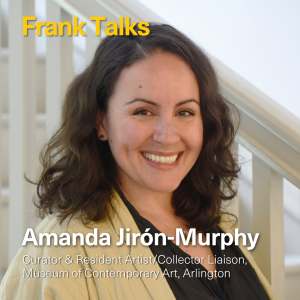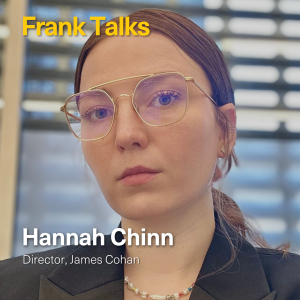We are so excited to bring you this week’s Frank Talk with Lucien Zayan. Lucien was born in Marseille in 1965 and moved to Paris when he was 19. After different positions in major French cultural institutions such as the Theatre de l’Odeon, Festival d’Art Lyrique d’Aix-en-Provence, Theatre de la Madeleine, Lucien decided to take 3 months break and go to NYC. At the end of his stay, Lucien discovered the 1863 building located at 51 Bergen street and literally falls in love with it. The building itself inspired him to do the project of a multidisciplinary arts space presenting visual art, dance, music, theater, movies and also be the home of 27 resident artists. The Invisible Dog Art Center opened in October 2009. In November 2018, Lucien Zayan discovers another one of his passions: cooking. He created a new space dedicated to food experiences: la Salle A Manger, a contemporary reimagining of an old fashion dining room where he cooks intimate dinners for his selected guests, artists and supporters of the arts. SAM has become the fundraising force behind The Invisible Dog. Zayan lives and works on Bergen street, Brooklyn. Please enjoy this week’s Frank Talk below!
What was your first job in the Arts?
In 1988, I’m 23 years old. I want to be an actor, but I just realized that I won’t be a star (which was my real secret desire I have to confess). It’s the end of the semester at my acting school in Paris, and I decide to fly to Alexandria (Egypt) where my parents are living and spend 3 summer months with them and figure out my future. At the French Institute (the cultural services of the French Embassy), there is a new director and he urgently needs someone who speaks French and Arabic to help him organize a… theater workshop. I‘m hired for 3 weeks. I will stay 3 years. It was like an epiphany. All of a sudden, I discovered the backstage, what was this invisible world of admin, tech, etc. and I loved it. I did not want to be a star anymore, I just wanted to be behind them: 20 feet from stardom.
What was the most useful or important thing you learned at that job?
Rigor, organization, understanding of artists needs and…lightness. Not take things too seriously.
Tell us a little more about yourself. When did you realize you wanted to pursue a career in this industry?
Right after this first experience in Egypt, I knew that I had found my vocation and my future. I went back to Paris, found a job at the Theatre de l’Odéon Theatre de l’Europe and from there, I worked my whole life for theater, dance, opera and arts in general and there hasn’t been a day I haven’t had fun and enjoyed my job. It’s something symbiotic between my private and professional life. Both are intimately tied up, both have a lot of respect for each other. I’m never at work, I’m never on vacation, I’m always at both at the same time.
What do you do now?
Right now, I’m answering your questions while I am myself asking a lot of questions to my friends who are fighting against injustice and police violence in order to find the best way to support them. And we just launched a new music video project called PRIDE and supporting LGBTQ+ artists.
And when I have some time left, I’m the director/chief curator at The Invisible Dog Art Center in Brooklyn and Chef at la Salle A Manger (SAM) a food-art related project I have created two years ago.
Where are you from?
I like to think I’m from where I live. After being from Marseille (France), Alexandria (Egypt), Paris (France), I’m now from New York City (USA).
What is the arts community like there?
Vibrant, multiple, rich, supported, struggling…
Has where you come from shaped what you do in the arts today?
Luckily yes! Each experience is a layer of knowledge, of success, of failure, of joy and of sadness. And I cannot wait to see what has shaped me today for tomorrow.
What is the best piece of advice you can give about working in the art world?
Listen to the artists and don’t try to interfere in their creative process. I love this advice written on the wall of Steven and William Ladd’s studio of two NYC based artists: “Spend your life doing what you love. Be focused and disciplined. Collaborate.”
What is one of your greatest accomplishments in your career so far?
With no hesitation, The Invisible Dog! The sum of my greatest accomplishments and experiences. It’s quite joyous to design a project exactly the way you want it. I really put together the best of each job I had in the past and assembled each piece to create the arts center of my dream. It’s quite rare to be able to do this.
What has been a challenge for you?
I won’t call it a challenge. When I arrived in NYC in 2008, I fell in love with the building at 51 Bergen street and the building itself inspired me to do the project of creating a multidisciplinary arts space. It became an obsession not only to open it but to keep it open. 11 years later, it’s the same love and obsession.
What is something you do every day at the office (or your current home office)?
A nap around 2pm. 20-30 min max. Essential when you have a night life.
What is one of the weirdest things you have had to do on the job in your career?
Ha! Everything is weird and I love doing weird things, they are always fun especially when you greet guests (35,000 per year at the invisible dog). Like this phone charger that clogged the toilet during a 400-guest event. Right after we removed it – it wasn’t nice – a guest showed up at the front desk and genuinely asked “did you find a phone charger by any chance?”
What defines a good employee? What defines a good boss?
They cannot be defined separately, I guess. What defines a good boss-employee relationship I would say. Trust and delegation are key.
What do you think makes a person hirable?
What’s usually seen as a weakness, things like timidness, vulnerability, or just lack of experience. I believe in instinct and what guts say. Remember that they are the epicenter of human emotions.
What is your advice to making yourself stand out in your workplace? Any good tips for a giving a great interview?
Be natural, be yourself, show your successes—that’s fine. But also, show your failures and explain honestly why you failed and learn to use this as an asset.
Is there any advice you would like to give people entering the art world?
Art world is not more fun than any other world: it’s 90% hard work, 10% fun. And mostly no weekend. Make sure you really want this.
Any other anecdotes about your working experience that you would like to share?
Hire me, I will write a 1000 pages essay.
What is the best exhibition you have seen in the last year?
I see a lot of exhibitions and it’s hard to say which one is the best. I like shows I don’t like at all, shows I get mad at. They definitely have the strongest echo in my brain. But I’m not going to tell you which one was the worst one.
If you could own a work by 5 different artists, who would be in your collection?
Alexander Calder, Marc Rothko, Markus Raetz, Lucio Fontana and Nan Goldin (I should just email her right?).
Have you seen any virtual exhibitions recently that you would like to comment on?
The only one I looked at was Frieze NYC and I found it so boring. Not the artworks themselves but just the fact that I needed to look at over 200 pages on my laptop. I don’t believe very much for now in all those virtual exhibitions. I’m receiving dozens of emails of company offering to digitalize the art collection of Invisible Dog but nothing is really solid enough. It’s just surfing on the current trend.
What artwork is in your home office?
I have more than 300 pieces of artwork at home, at the invisble dog, in storage and under my bed.
What is your greatest WFH challenge? Or a WFH luxury you don’t want to lose ever again?
I’ve practiced WFH for many years now, the current situation did not change my habits. I wake up at 4-5am every day and work until 8 or 9. At coffee time, it’s already midday for me. The luxury is I don’t need too much sleep. For many, WFH is not a good experience because going to the office is often their only way to socialize and escape home. The current reflection about WFH is fascinating especially on the social and architectural side.
How do you think art can play a fundamental role in the world’s recovery?
Art has always played an important role. I read recently someone saying “after 9/11, I felt everything was back to normal the evening I attended a Broadway show for the first time after the attack”. Isn’t it beautiful?
How do you think art should be shared and/or experienced moving forward?
I think we are already very lucky. Look how many ways we have to see art: galleries, museums, fairs, internet, Instagram (one of my favorite source of research for new artists), not-for-profits of all size, streets… but I have secret dream: be part of a piece of art: imagine someone genius creates a program that will propel you into an art piece, and all of the sudden you are a line of Sol Lewitt, a wrinkle of Mona Lisa, the dog in Velasquez’s Las Meninas. This is the future!
How has your current job adapted to the new virtual landscape? What do you think can be done better?
It may be funny but my weekly phone report shows a drop of 25% of the usage of my devices. I read more books, catalogues, and definitely have more long conversations over the phone. I started also to give online cooking classes – public and private – it’s fun and takes a lot of my time. Maybe I’ll become a YouTube star (old reminiscent dream 😉
What is your go to snack in quarantine? And your go to soundtrack?
I’m French, so I was educated with “no snacks.” We have so many restrictive rules about food that I’m often fascinated when my lover can eat an ice cream just before dinner.
My favorite soundtrack is Wagner’s ring cycle. 16 hours of music and I’d often rather stay in silence than listen to something else.
Since we are all at home and exploring more galleries and museums online, perhaps some for the first time, when the quarantine is lifted, what is your first art filled destination?
Ahah I don’t really know. I want a big party, until early morning, at home with my dear friends.
It can be argued that the art world is finally forced to adopt and adapt technologies that have long been a part of other industries. Agree or Disagree?
Disagree. Art is using a lot of technologies already and sometimes there are innovators. Look at how the Met created the most impressive tech program to rebuild the broken Adam. Stage directors are beautifully using technology for decades. Now if you are talking about Zoom, it’s just a tool. 10 years ago, Skype was the finest. A technology pushes another one. And it’s the same for the last 6000 years.
And finally, do you think the art world should be more transparent?
You know it’s like living in a big city. Your world is your neighborhood, not the whole city. Each neighborhood is made of families. And families have secrets.
